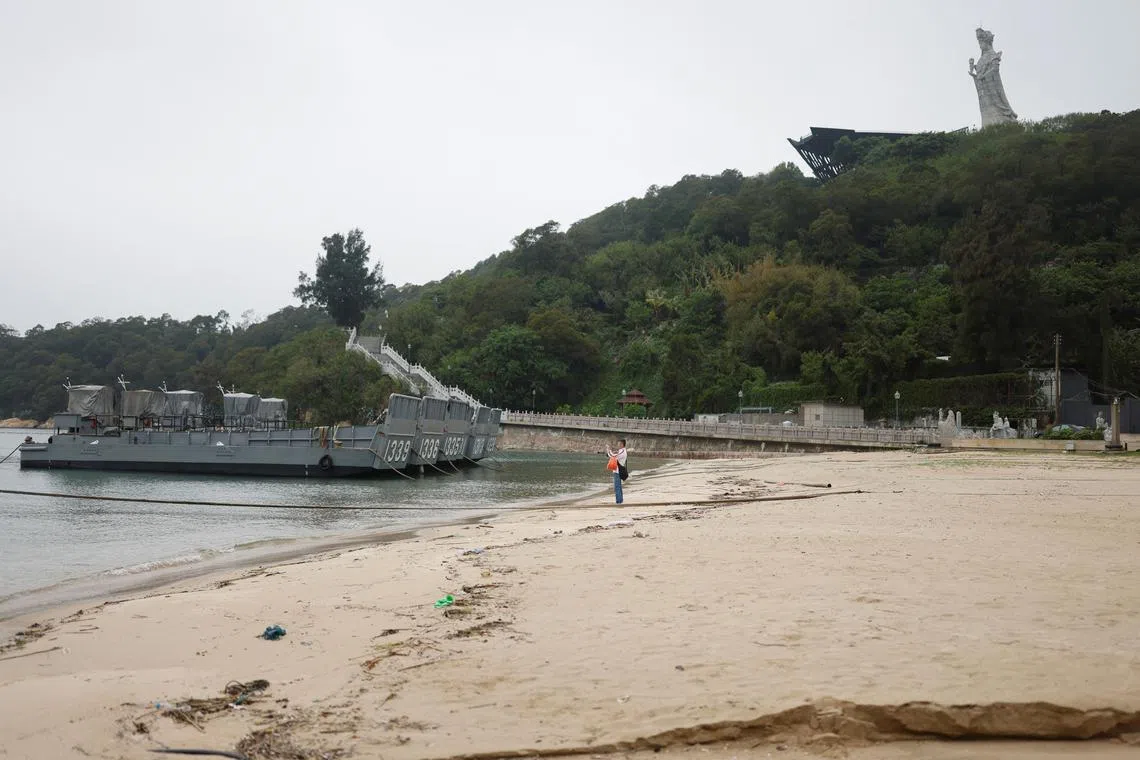War over Taiwan unlikely despite rise in temperatures, says Chinese scholar at Nikkei forum
Sign up now: Get ST's newsletters delivered to your inbox

The Taiwan Navy's landing crafts on Nangan island, part of the Matsu archipelago in Taiwan, in April.
PHOTO: REUTERS
Follow topic:
A war between China and the United States over Taiwan in the near future is unlikely despite rising temperatures in the Taiwan Strait in recent years, said a prominent Chinese international relations academic.
Projections by top US military leaders that China could be ready for a war by 2027
He noted that there have been many predictions about military conflicts in the Taiwan Strait, but “nothing has happened”.
“As long as Taiwan is not seceding from China, that is okay. We can wait, and we can continue with our peaceful unification policy,” he said at the Nikkei Future of Asia forum in Tokyo.
Prof Jia was speaking during an hour-long panel discussion. The other two speakers were Dr Kori Schake, director of foreign and defence policy studies at the American Enterprise Institute, a Washington-based think-tank, and former Indonesian ambassador to the US, Dr Dino Patti Djalal.
Worries about a hot conflict over Taiwan have escalated in recent years.
Admiral Philip Davidson, the former chief of the US Indo-Pacific Command, testified to a Senate committee in March 2021 that China may try to attack Taiwan by 2027 – the 100th anniversary of the People’s Liberation Army.
In a speech at the twice-a-decade party congress in October 2022, President Xi Jinping said that reunification with Taiwan was a “natural requirement of the great rejuvenation of the Chinese nation”
In August 2022, then US House Speaker Nancy Pelosi visited the island,
Prof Jia said that the ball is in fact in Taipei and Washington’s court. He argued that there are political dynamics in both places pushing Taiwan towards independence.
“The US Congress is now playing a very active role, complicating the situation. So, we hope that on the Taiwan issue, Taipei and Washington would take more caution not to provoke China into taking this unnecessary move (of using force),” he said.
But Dr Schake pushed back against his claim of provocation, saying that the US policy is to arm Taiwan so as to deter China from attacking the island.
Asked by moderator Hiroyuki Akita from Japanese media organisation Nikkei on whether the US military will intervene in a potential conflict over Taiwan, she said the American public would be inspired by a fight for freedom – as was the case for the Ukraine war.
Before the Russian invasion in February 2022,
In helping Ukraine, the US government is responding to public pressure. “I think you would see the same dynamic if China were to attack Taiwan – people fighting for their freedom are natural American allies in the world,” she said.
She added that American policy is to help Taiwan be strong enough so that China does not try to take military action. “I think that is the right policy, and I wish we had helped make Ukraine strong enough that Russia didn’t risk it.”
Dr Dino, who is founder and chairman of the Foreign Policy Community of Indonesia, said that in a multipolar world with two superpowers, the biggest question is what kind of power China would be.
“Will China be the same power that it is now – 20, 30 years from now? Because when you grow your power, you tend to act differently – that is what happens to powers who rise.
“We have got the US figured out: You have been a superpower for a long time – we know what you do, what you don’t do. But China, if it does become a superpower in 20, 30 years’ time, we still don’t know,” he said.
That is why countries are looking at China’s behaviour in the South China Sea and elsewhere to get a glimpse of what kind of power it will become, and what values it will embrace, he added.
“I think Beijing should be sensitive about this as well.”

